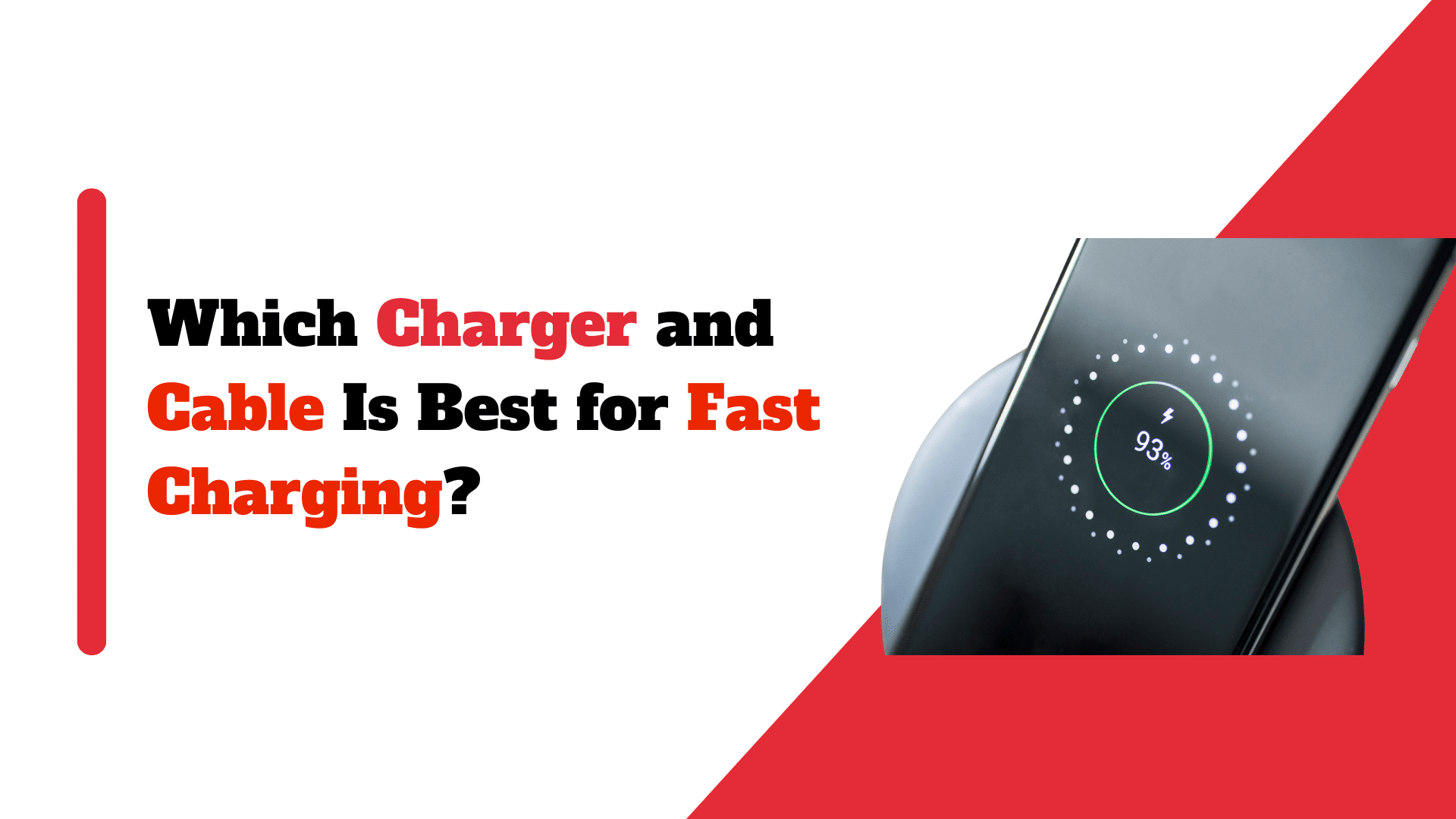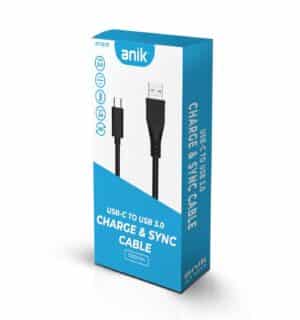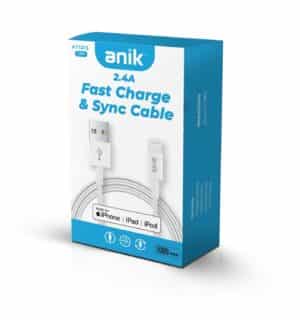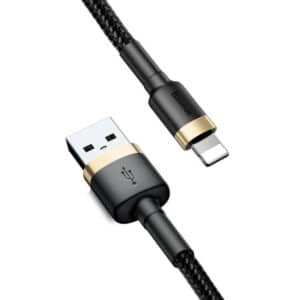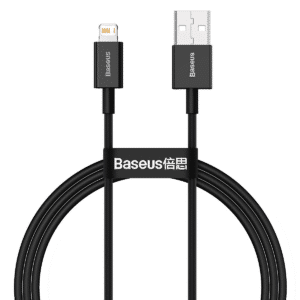Which charger and cable is best for fast charging? Fast charging technology has revolutionised the way we charge our devices, providing a quick and efficient solution for powering up our smartphones, tablets, and other electronic gadgets. Unlike traditional chargers that take hours to fully charge a device, fast chargers can significantly reduce the charging time by delivering a higher amount of power to the battery.
The principle behind fast charging is simple: it involves increasing the current or voltage supplied to the device’s battery, allowing it to charge at a much faster rate. This is achieved through advanced circuitry and components within both the charger and the device itself. By optimising power delivery, fast chargers can provide an impressive boost in charging speed without compromising on safety.
Key Takeaways
- Choosing the right charger and cable is crucial for fast charging technology.
- USB-C cables are generally better for fast charging than Lightning cables.
- Look for fast charging compatibility and consider factors like wattage and amperage before buying a charger and cable.
- Top brands offering fast charging options include Anker, Belkin, and Samsung.
- Fast charging can impact battery life, but optimising performance and following safety precautions can help mitigate any negative effects.
Importance of Choosing the Right Charger and Cable
While fast charging offers undeniable benefits in terms of convenience and efficiency, using an incompatible charger or cable can have adverse effects on both your device’s battery life and overall charging speed. The wrong combination may result in slower charging times or even damage your device’s battery over time.
Using a charger with insufficient wattage or amperage may not be able to deliver enough power for fast charging capabilities. Similarly, using a low-quality cable with inadequate data transfer capabilities can hinder optimal performance.
Types of Chargers and Cables Available in the Market
When it comes to choosing a charger for your devices, you’ll find various options available in today’s market. Wall chargers are perhaps one of the most common types used at home or office settings as they connect directly into an electrical outlet.
Car chargers are designed specifically for use while driving and typically plug into your vehicle’s cigarette lighter socket or USB port. These are convenient options for keeping your devices charged during long commutes or road trips.
Portable chargers offer another level of convenience as they allow you to charge your devices on-the-go without requiring access to an electrical outlet. These portable power banks come in various sizes and capacities, making them suitable for different charging needs.
When it comes to cables, there are several types to choose from. USB-C cables have gained popularity in recent years due to their versatility and ability to deliver fast charging speeds. Lightning cables, on the other hand, are proprietary connectors used by Apple devices. Micro-USB cables are still commonly used for older devices but are gradually being phased out in favor of USB-C.
USB-C vs. Lightning Cables: Which One Is Better for Fast Charging?
| Comparison | USB-C | Lightning |
|---|---|---|
| Charging Speed | Up to 100W | Up to 18W |
| Data Transfer Speed | Up to 10Gbps | Up to 480Mbps |
| Compatibility | Compatible with a wide range of devices | Only compatible with Apple devices |
| Cost | Relatively inexpensive | More expensive than USB-C |
| Availability | Widely available | Only available from Apple or licensed manufacturers |
The choice between USB-C and Lightning cables largely depends on the type of device you own. While both cable types can support fast charging, they have different compatibility requirements.
USB-C is a universal standard that works with a wide range of devices from various manufacturers including Android smartphones, tablets, laptops, and even some Apple products like MacBooks. It offers faster data transfer speeds and higher power delivery capabilities compared to its predecessors.
Lightning cables, on the other hand, are exclusively designed for Apple devices such as iPhones and iPads. While they also support fast charging when paired with compatible chargers, their usage is limited to Apple products only.
Also Read: Can I Use the Same Charger for My iPhone and iPad
Which Charger Is Best for Fast Charging Samsung Galaxy S24?
For fast charging the Samsung Galaxy S24, it’s best to use a charger that supports USB Power Delivery (USB PD) or Qualcomm Quick Charge (QC) technology. Specifically, for the Galaxy S24, a charger with USB PD 3.0 or higher or QC 4.0 or higher would be ideal. These chargers can deliver higher power levels to the device, allowing for faster charging times.
ANIK AT1217 3A USB Type-C to USB 3.0 Charge Cable 1M
Introducing the ANIK AT1217 3A USB Type-C to USB 3.0 Charge Cable 1M, a premium solution for syncing and charging your devices. Crafted with utmost quality, this cable ensures seamless compatibility with your device of choice.
Features:
- Robust cord with metallic socket design
- Long-lasting materials for extended lifespan
- Pure copper core and metallic finish on port
- Versatile for various connection needs
- Charging speeds vary based on device and charger
- Environmentally conscious packaging, RoHS compliant production
65W GaN Fast Mobile Phone Tablet and Laptop Charger Type-C PD3.0 and USB-A QC3.0 Ports
Introducing our cutting-edge 65W GaN Fast Power Charger, the RH-PD65W. This sleek charger, adorned in pristine white, combines Type-C PD3.0 and USB-A QC3.0 Ports, delivering unparalleled versatility. Say farewell to sluggish charging as this powerhouse handles all your devices with ease. With its 65W maximum output, the Type-C port offers a range of voltage options for swift and efficient charging. Meanwhile, the USB-A port provides a robust 18W output. Embrace the future of charging with this compact yet mighty charger, bidding adieu to slow power delivery for good.
Key Features:
- Dual ports: Type-C PD3.0 and USB-A QC3.0
- Maximum 65W power output
- Type-C port offers multiple voltage options
- USB-A port delivers 18W output
- Sleek design in pristine white color
Baseus PD 20W 2m Superior Series Fast Charging Data Cable
Introducing the Baseus PD 20W 2m Superior Series Fast Charging Data Cable, your ultimate companion for charging and data transfer. Crafted for devices with USB ports, especially iPhones, this cable ensures swift power-ups and rapid data transfers with its PD 20W fast charging capability.
Key Features:
- 20W power and sturdy copper wire for faster, secure charging.
- Reinforced joints for anti-break design.
- High-quality aluminum alloy plug, resistant to oxidation and corrosion.
- Elastic, braided cord for durability and comfortable handling.
- No more annoying pop-up windows upon connection.
- Ideal for quick charging and fast data transfer needs.
Which Charger Is Best for Fast Charging iPhone 15?
When it comes to fast charging your iPhone 15, selecting the right charger is crucial for optimal performance. With various options available in the market, it’s essential to choose a charger that can efficiently deliver power to your device while ensuring compatibility and safety. Let’s explore the best chargers suited for fast charging your iPhone 15, providing you with the information you need to make an informed decision.
ANIK AT1215 2.4A USB to Lighting MFI Charge Cable 1M
The ANIK AT1215 2.4A USB to Lightning MFI Charge Cable 1M offers seamless synchronisation and fast charging for your devices. Its exceptional quality ensures reliable performance in various settings.
Features:
- Durable construction with a sturdy cord and metallic socket
- High-quality materials for extended lifespan
- Versatile usage for various settings
- Environmentally conscious packaging adhering to RoHS standards
Baseus 2m Fast Charge USB Data Charging Cable for iPhone
Experience seamless charging and data transfer with the Baseus 2m Fast Charge USB Data Charging Cable. Designed for iPhone devices, this cable offers quick charge transmission and broad compatibility with devices featuring a Lport.
Features:
- USB Type-A Power Delivery cable with Ljack compatibility
- Constructed from high-quality aluminum alloy for efficient charge and data transmission
- TPE interior, reinforced with a strong nylon braid and fishing line, reduces tangling
- Compatible with a wide range of devices featuring USB Type-A and Lport connections
Baseus 2.4A 1.5m Superior Series Fast Charging Data Cable for iPhone
Introducing the Baseus 2.4A 1.5m Superior Series Fast Charging Data Cable designed for IP devices, offering both charging and data transfer capabilities. Compatible with USB ports, particularly IPs, this cable delivers a 2.4A current for rapid charging and swift data transfer.
Features:
- Enhanced charging capability with a 2.4A current and robust copper wire for faster and more secure charging.
- Extra joint reinforcement ensures an anti-break design, enhancing durability.
- High-quality aluminum alloy plug resistant to oxidation and corrosion, ensuring longevity.
- Elastic cord crafted from solid and durable textiles, providing high elasticity, bending resistance, and a pleasant touch.
- Convenient feature eliminates irritating pop-up windows upon cable insertion.
- Perfect for both quick charging and fast data transfer, offering versatility and efficiency.
Also Read: Wireless charging vs Cable charging
How to Identify a Fast Charging Compatible Charger and Cable
To ensure you’re using a charger and cable that supports fast charging technology for your specific device(s), there are a few key factors you should consider:
Check the wattage: Fast chargers typically have higher wattage ratings compared to standard chargers. Look for chargers that provide at least 18W or more output power.
Verify voltage compatibility: Different regions may have varying voltage standards (e.g., 110V or 220V). Ensure your charger supports the appropriate voltage range.
Amperage matters too: Higher amperage allows more current flow into your device’s battery during charging sessions.
Cable quality: Invest in high-quality cables that are designed to handle fast charging speeds and data transfer rates. Look for cables with thicker wires and reinforced connectors.
Factors to Consider Before Buying a Fast Charging Charger and Cable
Before purchasing a fast charging charger and cable, it’s essential to consider several factors to ensure compatibility and optimal performance:
Device compatibility: Check if your device supports fast charging technology, as not all devices are capable of utilising this feature.
Charging speed requirements: Determine how quickly you need your device(s) to charge. Different chargers offer varying levels of power delivery, so choose one that meets your needs.
Portability: If you frequently travel or need a charger for on-the-go use, consider the size, weight, and portability of the charger.
Brand reputation: Opt for chargers from reputable brands known for their quality products and safety standards.
Factors to Consider Before Buying a Fast Charging Charger and Cable
While fast charging offers undeniable convenience by reducing the time spent waiting for our devices to charge fully, it’s important to understand its impact on battery health.
Fast charging typically involves delivering higher amounts of power to the battery at once. While modern batteries are designed with built-in safeguards against overcharging or overheating during rapid charge cycles, prolonged exposure to high currents can still affect long-term battery health.
Frequent use of fast chargers may lead to increased heat generation within the device’s battery cells due to higher current flow rates. This excess heat can accelerate chemical reactions within the battery cells over time which may result in reduced battery capacity and overall lifespan.
Tips to Optimise Fast Charging Performance
To maximise the benefits of fast charging while minimising potential risks, here are some tips to optimise your charging experience:
Use the original charger: Whenever possible, use the charger that came with your device or purchase chargers recommended by the manufacturer. These chargers are specifically designed for your device and ensure compatibility and safety.
Avoid extreme temperatures: Charging your device in extremely hot or cold environments can affect both charging speed and battery health. Optimal temperature ranges for charging typically fall between 20°C to 30°C (68°F to 86°F).
Remove protective cases: Thick or rugged phone cases can trap heat generated during fast charging, potentially affecting both the device’s temperature regulation and overall performance.
Avoid overcharging: While modern devices have built-in mechanisms to prevent overcharging, it’s still a good practice not to leave your device plugged in unnecessarily once it reaches full charge.
Common misconceptions about fast charging technology
Fast charging technology has been surrounded by various misconceptions that may lead users astray when it comes to understanding its capabilities and limitations. Let’s debunk some of these myths:
Fast chargers damage batteries: While fast chargers deliver higher currents than standard chargers, they are designed with safety features that protect against overcharging or overheating.
Fast charging always equals faster battery degradation: While rapid charge cycles generate more heat within batteries, modern devices employ advanced thermal management systems that mitigate potential damage caused by excessive heat.
All cables support fast charging equally: Not all cables are created equal when it comes to supporting high-speed data transfer rates and power delivery capabilities required for efficient fast charging.
Fast charging vs. wireless charging: Which one is better?
Wireless charging has gained popularity as an alternative method for powering up our devices without relying on traditional wired connections. However, when it comes to charging speed and efficiency, fast charging still holds an advantage.
While wireless charging offers convenience by eliminating the need for cables, it typically delivers slower charging speeds compared to fast chargers. Wireless chargers also tend to generate more heat during the charging process, which can affect overall battery health over time.
Fast chargers, on the other hand, provide faster and more efficient power delivery directly through a wired connection. They offer higher wattage ratings and can charge devices at a much quicker pace compared to wireless alternatives.
How to troubleshoot common issues with fast charging
Despite its many benefits, users may encounter some common issues when using fast charging technology. Here are some troubleshooting tips for resolving these problems:
1) Ensure proper cable connection: Make sure the charger is securely connected to both your device and the power source.
2) Clean your device’s charging port: Dust or debris in your device’s charging port can hinder proper contact between the cable and port. Use compressed air or a soft brush to clean it gently.
3) Try a different charger or cable: If you’re experiencing slow or inconsistent charging speeds, try using another compatible charger or cable.
4) Restart your device: Sometimes restarting your device can resolve temporary software glitches that may be affecting its ability to charge quickly.
Fast charging safety precautions to keep in mind
While fast chargers are designed with safety features in place, it’s important always to prioritise safety when using any electronic devices:
Avoid counterfeit products: Purchase chargers and cables from reputable brands or authorised retailers as counterfeit products may not meet necessary safety standards.
Do not use damaged cables or chargers: Frayed wires or broken connectors pose risks of electrical shorts or even electric shocks.
Keep an eye on temperature levels: If you notice excessive heat generation during fast-charging sessions (e.g., hot-to-touch devices), unplug the charger and allow it to cool down before continuing.
Do not cover or obstruct ventilation areas on chargers: Blocking airflow can lead to overheating, potentially causing damage to both the charger and your device.
Choosing the right charger and cable for fast charging is crucial for maximising charging speed while ensuring the longevity of your device’s battery. USB-C and Lightning cables are popular choices, each with its own compatibility requirements. Identifying a fast charging compatible charger involves considering factors such as wattage, voltage, amperage, and cable quality.
While fast charging offers convenience, it’s important to understand its impact on battery health. Optimising fast charging performance involves using original chargers when possible, avoiding extreme temperatures during charging sessions, removing protective cases that trap heat, and avoiding overcharging.
Fast charging technology has been surrounded by misconceptions that need debunking. When comparing fast charging with wireless charging methods, wired connections still offer faster speeds. Troubleshooting common issues may involve checking cable connections or trying different chargers/cables.
Lastly, safety precautions should always be followed when using any electronic devices. Avoid counterfeit products, use undamaged cables/chargers, monitor temperature levels during fast-charging sessions, and ensure proper ventilation for chargers.
By understanding these key points and making informed choices when it comes to selecting chargers and cables for you Apple or Samsung devices, fast charging technology usage in our daily lives will help us optimise our devices’ performance while keeping them safe in the long run.

